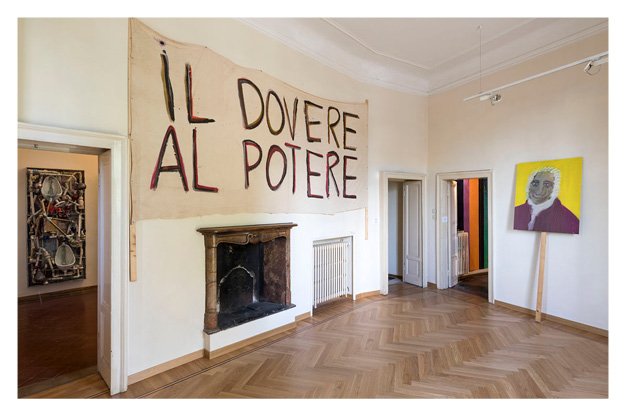Three artists meet in this fascinating room in Casa Testori, creating a dialogue that has recourse to bold, involving expressive forms. Marco Cingolani has brought into play a banner-poster, an authentic piece of publicity art. The slogan, in great letters, poses a demand that might seem obvious if it were not negated at every moment by reality Il dovere al potere [Let Power Stand by Duty]. The sheer nakedness of the work leaves us speechless: it is like a cry echoing in silence. While the banner is a work that Cingolani has carried with him for many years, almost as an imploration, the painting in this room was specially created for the exhibition at Casa Testori. It is a portrait of Bernard de Mandeville, an Anglo-Dutch physician, philosopher and satirist to whom we owe a definition of hypocrisy which has entered the common language: “Private vices, public benefits”. His best-known book, in fact, published in 1714, is entitled “The Fable of the Bees: or, Private Vices, Public Benefits”. In its first version, it was called “The Grumbling Hive, or Knaves Turn’d Honest”, leaving no doubt as to the real identity of the “public benefits”.
Massimo Kaufmann has brought to Casa Testori a “shouted-to-the-fourwinds” version of a work he created at the beginning of the 1990s. As with Cingolani, the chosen means of expression was deliberately shouted to the four winds: a wallpaper which exaggeratedly enlarges the original and emphasizes its disquieting message. The cycle took as its inspiration Goya’s celebrated caprices, a merciless depiction of corrupt society, dominated by lies and abuse of power. Kaufmann reinforces this message with a bold, contemporary language. The originals were created, in fact, with typewriter characters, accentuating the caricatural aspects of this portrayal of a society seemingly corroded by all-pervasive corruption. In order to stress the public scope of the message contained in this work, Kaufmann also created a signed and numbered version of the wallpaper, on sale to visitors.
Stefano Arienti has contributed a fascinating Installation to this room, entitled Lame Italia [Italian Ploughshares], in which tools belonging to memories of the artist’s rural origins – he was born in Asola, in the Province of Mantua – assume an enigmatic appearance, as if they have lost the positive sense of their function. A delicate metaphor illustrating the overturning of values that ensues as a result of social pathologies such as corruption.







